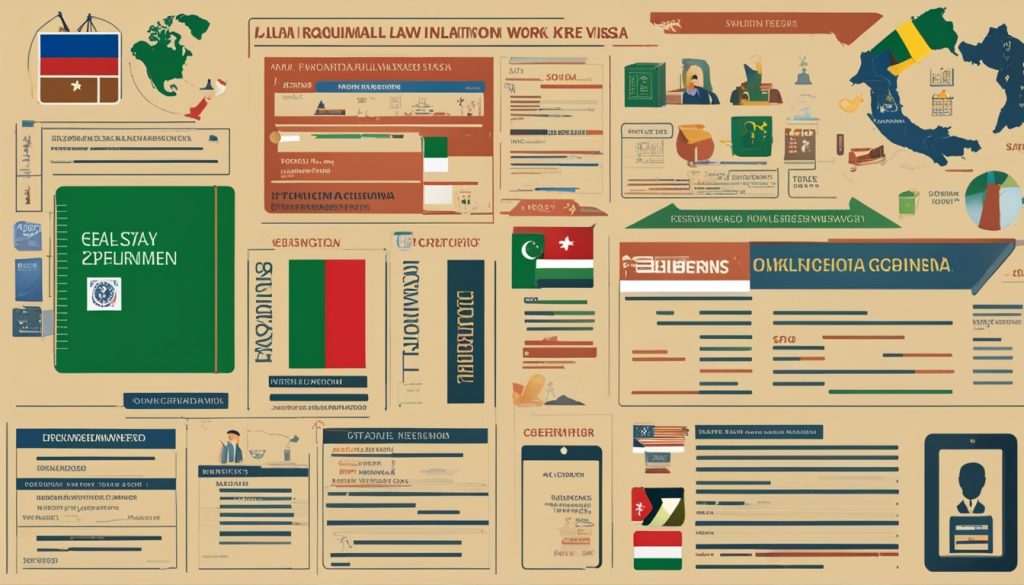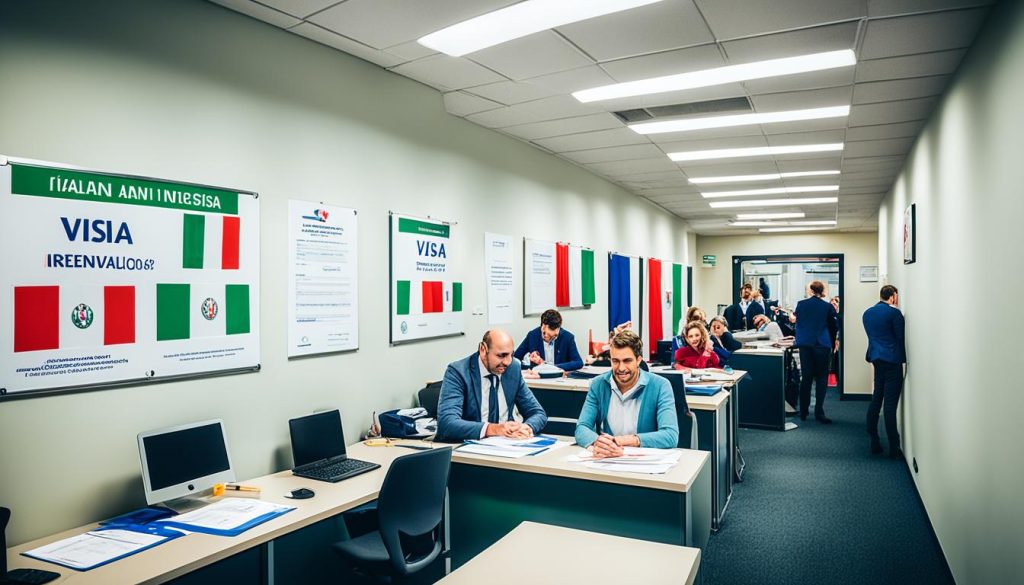This guide is for UK nationals wanting to work in Italy. It offers key insights into Italian work visas and permits. Knowing about these rules is crucial for a smooth move to Italy. We’ll look at different work visas, who can get them, how to apply, and what life is like in Italy. This will give you all the info you need to apply with confidence.
Key Takeaways
- Detailed exploration of Italian work visas available for UK nationals.
- Eligibility requirements tailored to different visa types.
- Step-by-step guide to the application process for Italian permits.
- Essential documentation needed for visa applications.
- Insights into living in Italy, including cultural considerations.
- Support resources and networks for UK nationals in Italy.
Understanding the Italian Work Visa Landscape
The rules for Italian work visas have changed a lot, especially for UK citizens after Brexit. Now, there are new Visa Policies for people wanting to work in Italy.
Italy has different Italian Work Visa types for various jobs and stay lengths. This knowledge helps UK citizens understand their options and choose the right path for their careers abroad.
The visa system now supports both short and long-term jobs in Italy. Short-term visas are for seasonal workers and those on short projects. Long-term visas are for those looking for a permanent job or a long stay.
The Visa Policies show how Italy’s economy and job market work. They focus on skills and what the job market needs. UK citizens can find legal work in Italy if they know the right steps and get the right help.
Types of Italian Work Visas for UK Nationals
UK nationals can explore various work visas for jobs in Italy. These visas suit different needs, from short-term to long-term work. They make it easier to join the Italian workforce.
Short-term Work Visas
Short-term Work Visas are for those looking for temporary jobs. They’re great for jobs in tourism and agriculture during busy times. UK workers like these visas for their flexibility and quick application process.
Seasonal work is a big part of these visas. They’re for short periods and help with important jobs. You’ll need things like:
- A valid employment contract for seasonal work
- Proof of enough money
- Health insurance documents
These visas take a few weeks to a couple of months to process. This depends on your application details.
Long-term Work Visas
If you plan to stay in Italy for a long time, you’ll need a Long-term Work Visa. This is for those with job offers from Italian employers. It’s important for skilled workers, as employers often sponsor these visas.
To get a long-term visa, you’ll need:
- An official job offer from an Italian employer
- Documents from your employer
- Qualifications for the job
- Maybe an EU Blue Card for highly skilled workers
For Yearly Contracts, you’ll need a lot of documents. This shows you have a steady job. Getting this visa can be complex, so be well-prepared.
| Visa Type | Duration | Key Requirements |
|---|---|---|
| Short-term Work Visas | Up to 6 months | Seasonal employment contract, proof of finances |
| Long-term Work Visas | Over 6 months | Employment offer, employer sponsorship |
Eligibility Requirements for Italian Work Visas

UK nationals need to meet specific Visa Eligibility criteria for an Italian work visa. These include general and specific requirements for different visa types. Knowing the Application Criteria can greatly improve your chances of getting approved.
General Criteria for Application
UK citizens applying for an Italian work visa must follow certain rules. These include age limits, health insurance, and a clean immigration record. They also need to show they’re right for the job they want. Common requirements are:
- Minimum age of 18
- Proof of adequate health insurance coverage
- No previous visa violations or significant legal issues
- Financial proof to support oneself during initial stay
Specific Qualifications Based on Visa Type
Each visa type has its own Work Visa Qualifications. These depend on your job and education background. Knowing what skills you need for each visa makes applying easier. Some qualifications include:
- Educational credentials matching the job offer
- Relevant work experience in the field
- Language skills in Italian or English, based on job needs
- Health checks to ensure you’re fit for work
The Application Process for Italian Work Visas
Applying for an Italian work visa might seem hard, but it’s easier with a clear plan. This guide takes you from the start to submitting your application at the Italian Consulate. You’ll need to know about documents, timelines, and fees for a successful application.
Step-by-Step Guide to Application
- Research the visa types that fit your job needs.
- Collect all needed documents, like proof of job, money, and qualifications.
- Fill out forms carefully to avoid mistakes that could delay your application.
- Book an appointment at the Italian Consulate for your application.
- Hand in your application and pay the fees.
- Wait for a decision, which might take a few weeks.
Common Pitfalls to Avoid
Many people make mistakes during the visa application. Knowing these mistakes can help avoid denials. Here are some key points:
- Make sure you have all the needed documents and they’re correct.
- Check your forms for any mistakes before you send them.
- Don’t miss your appointment to avoid delays.
- Follow the rules given by the Italian Consulate closely.
By avoiding these common issues, you can make the process smoother and avoid problems.
Essential Documentation for Visa Applications
Getting an Italian work visa needs careful attention to detail. UK citizens must gather all Visa Documentation needed. This is key to a smooth application process.
A valid passport is the first thing you need, with at least six months left before it expires. You also need an employment contract with an Italian employer. This shows you have a job in Italy. Having proof of where you’ll live is also crucial, along with financial statements to show you can support yourself.
It’s vital that all documents you submit are genuine. Sometimes, you might need official translations too. This makes sure your documents meet Italy’s rules. UK citizens should check the Application Forms and rules carefully to avoid delays or problems.
| Required Document | Description |
|---|---|
| Valid Passport | Must have at least six months of validity remaining. |
| Employment Contract | Official job offer from an Italian employer. |
| Proof of Accommodation | Document verifying a place to stay in Italy. |
| Financial Statements | Evidence of sufficient funds to support oneself. |
UK nationals should prepare all Visa Documentation needed for a smooth application. Knowing what Required Papers you need and how to fill out Application Forms helps a lot.
Italian Work Visas: Fees and Processing Times
For UK nationals applying for Italian work visas, knowing the costs and wait times is key. This part covers the Visa Fees, Application Costs, and Visa Processing Times. This info helps with your planning and what to expect when applying.
Overview of Associated Costs
Applying for an Italian work visa means facing several costs. These include:
- Visa Fees: These fees depend on the visa type and can be from €80 to €200.
- Legal Fees: Legal help can cost about €150.
- Translation Costs: Translation services might add €30 to €60.
Make sure to check these Financial Requirements carefully to avoid surprise costs during the application.
Typical Processing Duration
The time it takes to get a work visa varies a lot. Factors that affect Visa Processing Times are:
- Type of visa applied for
- Busy times for applying
- How much work the consulate has
Wait times can be from 15 days to several months. It’s best to apply early to avoid delays.
Italian Work Visas for Freelancers and Remote Workers
UK nationals looking into Freelance Work Visas must meet certain criteria. They need to show they have the right documents and a solid client base. They also need to prove they live in Italy, have the right qualifications, and are actively working.
Criteria for Freelance Visa Applications
To get a freelance visa, you must do the following:
- Have a valid passport with six months left until it expires.
- Show proof that you are self-employed or a freelancer.
- Provide documents that prove you have a steady income.
- Have tax registrations and the right insurance policies.
- Bring contracts or agreements with your clients.
These steps are crucial to prove you are an Independent Contractor. They make sure your visa application is strong.
Adjusting to Remote Work Regulations
Remote work has changed Remote Work Policies. UK workers can now work for UK companies from Italy. This means they need to know about Italian Regulations.
- They can get exemptions for telecommuting under certain conditions.
- They must follow local tax laws while working from home.
- They need to know about employment rights and Italian labour laws.
Knowing these details helps freelancers fit into Italy’s work scene. It also helps them manage their Self-Employment status.
Getting Help: Resources and Support for UK Nationals
UK nationals looking to apply for an Italian work visa can find help from various Support Resources. These resources give important info and help at every step of the process.
Government websites are key for info. They list visa needs, guide you on how to apply, and point out important documents. Immigration lawyers also offer Assistance for UK Nationals. They explain legal details and help avoid mistakes.
Community support is also vital. Expats share their stories, making the move to Italy easier. Joining Networking groups can give you useful contacts, resources, and friends. This helps with both work and personal life.
Here’s a list of key resources:
| Resource Type | Description | Contact Method |
|---|---|---|
| Official Government Websites | Information on visa types and what you need | Website access |
| Immigration Lawyers | Personal advice on visa applications | Email or phone consultation |
| Community Support Networks | Groups for sharing experiences and advice | Social media, local meetups |
| Professional Networks | Networking for specific industries | Networking events, LinkedIn |
Renewal and Extension of Italian Work Visas

Understanding how to renew and extend your work visa in Italy is key. It helps you keep working in the country. You need to know the rules and what documents you need for renewal. This knowledge is crucial for continuing your job in Italy.
Understanding Renewal Processes
Renewing your Italian work visa means applying early before it expires. Here are the steps you need to follow:
- Collect all needed documents like proof of job, financial info, and past visa approval.
- Fill out the renewal application and send it to the right Italian authorities.
- Pay any fees for the renewal.
- Wait for confirmation that lets you keep working while your application is checked.
Criteria for Visa Extension
To get an extension, you must meet certain conditions. You need to show:
- You have a stable job with a registered employer.
- You can do your job well and adapt to new job chances.
- You follow the law, including paying taxes and living in Italy legally.
Meeting these criteria helps you get an extension. It also makes sure you follow Italian immigration laws while working there.
Italian Work Visas and the Italian Labour Market
The Labour Market in Italy is always changing, offering many Job Opportunities for UK professionals. It’s key to know the current trends for those looking to apply. Sectors like technology, engineering, and healthcare are growing fast, attracting workers from abroad. These industries offer many jobs but need specific skills that match what employers want.
Industry Trends and Job Prospects
In Italy, the Labour Market is shaped by the economy and what consumers want. Some major trends include:
- Digital Transformation: Technology’s role in business has led to a big demand for tech experts.
- Sustainability Initiatives: Companies are focusing on green technologies, creating jobs for experts in this field.
- Healthcare Expansion: The need for healthcare services means there are always jobs available, especially for medical staff.
UK nationals should think about getting the right qualifications and skills to stand out. Knowing how the Italian job market works can help make better career choices.
Understanding Employment Rights
Employment Rights are key to fair treatment in Italy. UK workers have many legal rights, such as:
- Fair Wages: Everyone gets paid fairly, with laws to prevent low wages.
- Standard Working Hours: There are rules about how many hours you can work and when you need breaks.
- Health Insurance: Everyone has access to healthcare, which is important for workers and their families.
- Workplace Safety: Laws make sure workplaces are safe, with steps to deal with dangers.
Knowing about these Worker Protections helps UK nationals stand up for their rights at work. Understanding legal rights makes for a safer and fairer work life in Italy.
Living in Italy: What UK Nationals Need to Know
For UK nationals thinking about moving to Italy, it’s key to know the basics of daily life. You’ll need to get used to things like finding a place to live, healthcare, and schools for your family. These things are important for feeling at home and fitting in.
Settling in Italy: Key Considerations
When you start your move, remember these points:
- Housing: Look into different areas to find the best fit for you. Cities are lively, while countryside areas are peaceful.
- Healthcare: Learn about Italy’s healthcare system. Signing up with the local health service will let you use the services for locals.
- Education: If you have kids, check out the school options. You’ll find international schools, local ones, and the Italian system, each with its own benefits.
- Local customs: Knowing about Italian ways will help you fit in. Joining in local events is a great way to learn about the culture.
Understanding Italian Culture and Lifestyle
Getting to know Italian traditions and social life will make your experience better. Italian Culture is full of festivals, food, and local differences. Here are some tips:
- Food: Food is a big part of life here. Visit local markets and try traditional dishes to really get into the culture.
- Festivals: Joining in local festivals lets you see how Italians live. You’ll see their traditions and enjoy the community spirit.
- Language: Learning Italian makes talking to locals easier. It helps you connect with people and enjoy your time more.
- Community involvement: Being part of local groups or sports teams can help you make friends and feel like you belong.
Support Networks for UK Nationals in Italy

Living in a new country can be both exciting and challenging for UK nationals in Italy. It’s important to build strong support networks to make the move easier. There are many expat networks and community resources for UK individuals, helping them make friends, find support, and discover useful resources.
Expats and Community Resources
There are many organisations that support UK nationals in Italy. These groups offer great help and ways to make new friends. Some top choices include:
- Local expat forums and online groups that talk about many topics, like finding a place to live and getting used to the culture.
- Social clubs for British culture, with events and meet-ups for new people to meet other expats.
- Official groups that give out info and support for UK nationals in Italy.
- Community support programs with workshops and social events to help make friends and networks.
Networking Opportunities in Italy
Professional networking is key for career growth and fitting in socially. UK nationals can go to expat networking events to meet local professionals and possible employers. Here are some ways to network professionally:
- Going to industry-specific networking events to learn about the Italian business world.
- Joining local chambers of commerce or professional groups for those working in Italy.
- Going to workshops and seminars to improve skills and meet more people.
- Using social media like LinkedIn to connect with professionals and share job leads.
Creating a supportive network in Italy helps with settling in and improving career chances. Being part of these expat networks and community groups lets UK nationals do well in their new home.
Italian Work Visas: Frequently Asked Questions
UK nationals often find the process of getting work visas for Italy complex. We’ve put together a list of Work Visas FAQs to help. These answers aim to clear up any confusion and make things easier to understand.
Many applicants ask about the rules for different work visas. They want to know if they need certain qualifications for their job in Italy. They also worry about what documents they must include in their application. Not having all the documents can cause delays or even a rejection.
It’s crucial to keep up with the latest immigration laws. Changes can affect how you apply for a visa. Knowing this can make moving to Italy for work easier. We hope these answers help you make informed choices and make your move smoother.
FAQ
What types of Italian work visas are available for UK nationals?
UK nationals can get different types of Italian work visas. These include short-term visas for seasonal jobs and long-term visas like employment-based visas and EU Blue Cards. The choice depends on their job needs and how long they plan to stay.
What are the eligibility requirements for applying for an Italian work visa?
To apply for an Italian work visa, UK nationals must meet certain requirements. They need to be of a certain age, have health insurance, and have the right qualifications for their job. This includes things like educational qualifications and work experience.
How does the application process for Italian work visas work?
The process starts with research and ends with submitting your application at an Italian consulate. You’ll need to collect all the required documents and know what could stop your application from being approved.
What documentation is required for an Italian work visa application?
You’ll need several documents for an Italian work visa application. These include a valid passport, a job contract, proof of where you’ll live, financial statements, and translated documents if needed.
What are the typical fees and processing times for Italian work visas?
The cost of an Italian work visa varies by type and includes application, legal, and translation fees. Processing times can change due to the workload of consulates and busy periods.
Are there specific visas for freelancers and remote workers?
Yes, UK nationals can apply for freelance work visas if they have a steady client base. There are also new rules for remote work in Italy under certain conditions.
What support resources are available for UK nationals during the visa application process?
There are many resources to help UK nationals with their visa application. These include government websites, immigration lawyers, and community networks that offer guidance and support.
How can UK nationals renew or extend their Italian work visa?
To renew or extend a visa, you need to submit certain documents before it expires. You must show you still have a job or have found a new one. This can affect if your extension is approved.
What should UK nationals know about the Italian labour market?
It’s important for UK nationals to know about the Italian job market. They should look into growing sectors and understand the rights of workers in Italy. This can help them find a job and work well in the local market.
What practical tips are there for settling in Italy as a UK national?
UK nationals should think about things like finding a place to live, healthcare, schools, and local customs. Joining the expat community can also give them useful advice and support for settling in Italy.
How important is networking for UK nationals living in Italy?
Networking is very important for UK nationals in Italy. It helps with both finding a job and making friends. Being part of expat networks and attending local events can lead to new job chances and supportive relationships.









